|
| Introduction
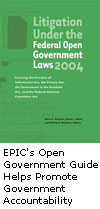 The
Freedom of Information Act establishes a
legal right for individuals to obtain records in the
possession
of government agencies. The FOIA is critical
for the functioning of democratic government because
it helps
ensure that the public is fully informed
about matters of public concern. The FOIA has helped
uncover fraud,
waste, and abuse in the federal government.
It has become particularly important in the last few
years
as the government has tried to keep more
of its activities secret. The
Freedom of Information Act establishes a
legal right for individuals to obtain records in the
possession
of government agencies. The FOIA is critical
for the functioning of democratic government because
it helps
ensure that the public is fully informed
about matters of public concern. The FOIA has helped
uncover fraud,
waste, and abuse in the federal government.
It has become particularly important in the last few
years
as the government has tried to keep more
of its activities secret.
A hallmark
of the new surveillance measures proposed
by various government agencies is their disregard
for public accountability. As the
government seeks to expand
its power to collect information about individuals,
it increasingly hides that surveillance
power behind a wall
of secrecy. Congress has long recognized
this tendency in the Executive Branch, and
sought to limit government
secrecy by creating legal obligations of
openness under the FOIA and the Privacy Act
of 1974. EPIC has
used these
open government laws aggressively to enable
public oversight of potentially invasive
surveillance initiatives.
Public access
through the FOIA not only allows for a more informed
public
debate over new surveillance proposals,
but also ensures accountability for
government officials. Public debate fosters
the development of more robust
security systems and leads to solutions
that better respect the nation's democratic
values. EPIC's FOIA litigation
activity over the past year has resulted
in disclosure of information
about several government surveillance
programs. The EPIC FOIA Gallery highlights
some of the most significant
documents we obtained this year. |
| |
|
| FBI Collects a Year's Worth of Passenger Data After 9/11

A FOIA document obtained by EPIC from NASA revealed that the FBI acquired a year's
worth of passenger data from Northwest Airlines after the September 11, 2001
terrorist attacks. The story was reported in newspapers across the country,
including on the front page of the New York Times and in the Washington Post
and Wall Street Journal. EPIC later learned through its FOIA litigation that
the FBI obtained 257.5 million Passenger Name Records following 9/11, and
that the Bureau has permanently incorporated the travel details of tens of
millions of innocent people into its investigative databases. |
|
|
| Acxiom Lobbies to Dilute Federal Privacy Laws
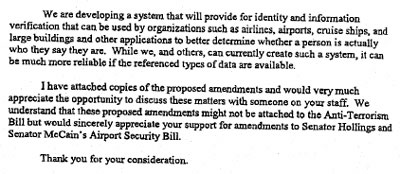
EPIC obtained documents under the FOIA showing that commercial data broker Acxiom pushed to water down key federal privacy laws immediately after the September 11, 2001 terrorist attacks. According to the documents, Acxiom sought broader access to "credit headers" and drivers information in order to develop a system for "identity and information verification that can be used by organizations such as airlines, airports, cruise ships, and large buildings and other applications to better determine whether a person is actually who they say they are." |
|
|
| Homeland Security Obtains Census Data on Arab Americans
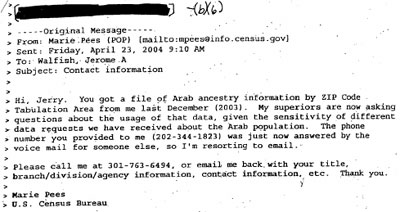
EPIC obtained heavily redacted documents through the FOIA revealing that the Census Bureau provided Customs and Border Protection, a subagency of the Department of Homeland Security, statistical data on people who identified themselves on the 2000 census as being of Arab ancestry. There is no indication that the agency requested similar information about any other ethnic group. As a result of the public outcry following EPIC's revelation, the Census Bureau revised its policy on providing information about sensitive populations to law enforcement and intelligence agencies. |
|
| EPIC Obtains FBI Reports to Congress Showing Move Away From Carnivore

EPIC
used the FOIA to obtain FBI reports to Congress
stating that the agency did not use its DCS 1000
Internet monitoring system -- formerly known
as Carnivore -- during fiscal years 2002 and
2003. According to the reports, the FBI used
commercially available software to conduct court-ordered
surveillance thirteen times during the two-year
period. The reports suggest that the FBI's need
for Carnivore-like Internet surveillance tools
is decreasing, likely because ISPs are providing
Internet traffic information directly to the
government. |
|
| Draft Privacy Impact Assessments Show CAPPS II Mission Creep
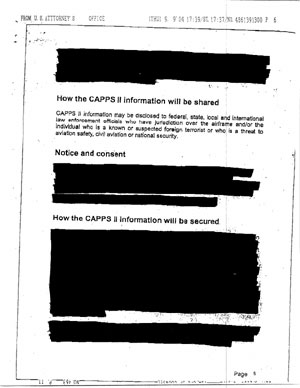 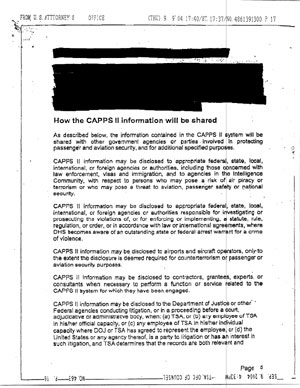
Through FOIA litigation with the Transportation Security Administration, EPIC obtained three heavily redacted draft privacy impact assessments the agency performed for the now-defunct second generation Computer Assisted Passenger Prescreening System (CAPPS II). The drafts, dated April 17, 2003, July 29, 2003, and July 30, 2003, reflected a dramatic expansion over just three and a half months in the ways passenger information collected for the program would have been shared. An article in the New York Times based on the documents reported that an agency spokesman confirmed the program had collapsed because its mission had become too broad. |
|
| ChoicePoint Sells International Personal Data to Law Enforcement Agencies
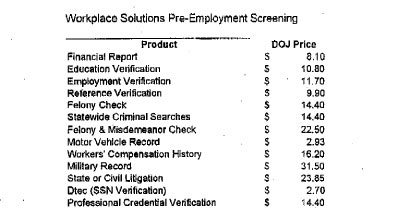
Since 2001, EPIC has sought out more than 2,500 documents about ChoicePoint's business relationship with U.S. government agencies. Among other things, documents obtained by EPIC under the FOIA show the company had a contract with the Immigration and Naturalization Service to provide citizen registry, motor vehicle, and other information for Brazil, Argentina, Mexico, Columbia, and Costa Rica. EPIC also obtained a message from the U.S. Embassy in Mexico to the White House, the Department of Homeland Security and other agencies, stating that Mexican newspapers and political leaders objected to the transfer of voting and driving records to ChoicePoint and warning that "a potential firestorm may be brewing." EPIC's FOIA work triggered international investigations into the sale of Latin Americans' personal information to ChoicePoint for the U.S. government's use. |
|
|